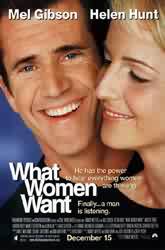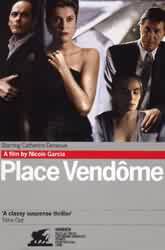 |
The Wisdom of Crocodiles (Dir: Po-Chih Leong, Starring Jude Law, Elina Löwensohn, Timothy Spall, Jack Davenport, Kerry Fox, Nick Lamont, Joseph O’Conor, Colin Salmon, Hitler Wong, and Ashley Artus) BY: DAVID PERRY |
| Cinema-Scene.com > Volume 2 > Number 50 |
Cinema-Scene.com
Volume 2, Number 50
This Week's Reviews: The Wisdom of Crocodiles, What Women Want, Place Vendôme.
This Week's Omissions: Dude, Where's My Car?, The Emperor's New Groove.
 |
The Wisdom of Crocodiles (Dir: Po-Chih Leong, Starring Jude Law, Elina Löwensohn, Timothy Spall, Jack Davenport, Kerry Fox, Nick Lamont, Joseph O’Conor, Colin Salmon, Hitler Wong, and Ashley Artus) BY: DAVID PERRY |
Steven Grlscz (Law) is a well-mannered British lad. He has a nice job as a medical technician and a nice line of girlfriends. The only real problem is that he has a medical conditions – one that makes him what we would call a vampire.
No he is no Dracula or Lestat, killing people as a lifeline to immortality – fearing garlic, crosses, holy water, and impalement. He is a normal human being that needs human blood to keep from dying. He even has to bite with his normal teeth to get to the blood.
But here’s the rub: he needs the blood of love – the emotional stream that yearns for him. In his line of business, he sees all kinds of kidney stones, each one the product of some emotion. The only kidney stone that he ever passes is the sliver from imbibing the love of someone.
He is a very seductive person and never seems to have a terribly hard time making relations with some woman before ultimately ending their life. When the film begins, he saves a suicidal lady (Fox, best remembered for her performance in Jane Campion’s An Angel at My Table) from jumping in front of a subway train only to convince her of his love so that he can, in turn, take away hers. Before long, they consummate the relationship – she thinks by having sex, but instead he kills her.
When he heads to his next victim, a young engineer (Löwensohn), he finds that he too has a love for her, something that he has never felt. To kill her means giving up on an emotion that he finally feels but it is the only way for him to survive.
The Wisdom of Crocodiles (the title is a reference to the belief that humans have three sides: simian, equine, and reptilian) is made in that old British independent fashion. Like Mike Hodges’ recent Croupier, it emphasizes style just as much as its substance, surely an offspring of the waning French New Wave.
Director Po-Chih Leong has not made a film since 1993’s Once Upon a Time in Shanghai, but he still has the style of any fine film director in England. Though he lacks the obsession with close-up that Hodges brings to a film, Leong does do his best to make every moment seem fresh in that distinctly European way. It’s sad that he has been left without a film for so long and refreshing to find this to be his return.
Paul Hoffman’s screenplay, lightly based upon Oscar Wilde’s The Portrait of Dorian Gray, intermixes the style of Leong with a genuine solemnity towards the subject of vampires. Neil Jordan, Tod Browning, Francis Ford Coppola, and Terence Fisher have all made turns at vampire stories, all of which were dependent on the rules and restrictions set forth in Bram Stoker’s Dracula (though, it should be noted that Coppola and Browning were both making adaptations of the Stoker novel). This film stands on its own but never scoffs at the rest of the vampire mythology.
Some would quickly remark that this film lacks the feeling of most vampire films, which is what I think really works for it. Like the Michael Almerayda adaptation of Shakespeare’s Hamlet earlier this year, this film uses the slick feel of modern, iconoclastic society and all its intricate mysteries for effect. There are great montages of sleek costumes smoothly passing over places unknown to anyone else – shots that make this film seem like a serene look at how cool vampires can be when they are out of the cape and puffy shirts.
Jude Law filmed this two years ago, before his recent, long-overdue breakout in Anthony Minghella’s The Talented Mr. Ripley. Law does a splendid job here, creating one of the most human vampires placed on the screen. In the hands of the wrong hands, this might have seemed like another ego-trip vamp (i.e. Brad Pitt’s Louis from Interview with the Vampire: The Vampire Chronicles). Law is one of the last actors most people would have thought of for the role of a vampire, but he proves more than able here. If only he could have been chosen to play Lestat in the upcoming The Queen of the Damned.
To think that this film, like Hodges’ Croupier (which
only came to America thanks to the splendid release scheduling of Shooting Gallery Films),
could have been left in England and never seen the light of day in the States -– I
can only be grateful of Miramax for distributing this film after Law’s Ripley Oscar
nomination. Now, if only Sony would push people to go back and catch his performance in
Andrew Niccol’s Gattaca, still his finest moment.

| BUY THIS FILM'S FROM AMAZON.COM |
REVIEWS OF THIS FILM |
 |
What Women Want (Dir: Nancy Meyers, Starring Mel Gibson, Helen Hunt, Alan Alda, Ashley Johnson, Mark Feuerstein, Marisa Tomei, Lauren Holly, Valerie Perrine, Maggie Egan, Heidi Merrick, Eric Balfour, Delta Burke, Bette Midler, and Loretta Devine) BY: DAVID PERRY |
Mel Gibson is Nick Marshall, a hotshot ad exec that juggles womanizing with acting like the biggest ass in America (think Bounce’s Buddy Amaral with ex-wife and kid). He shuffles through the local coffee shop, hitting on the waitress, before going into work, looking over every female in the office as being sex-objects, interjecting a dirty joke here and there to his closest friend (Feuerstein).
Nick’s idea of an evening is listening to an old vinyl of Sinatra before striking down another woman in her prime. Sure, this type of lifestyle has brought him a failed marriage and an unloving daughter (Johnson), but he still seems quite happy with the hand he has been dealt.
When a female competitor is hired to work with him, Nick sees her as someone to manipulate into quitting or doing such a horrid job that she must be fired -– her position happens to be the one that he wants. Her issuance of a box of female products to the staff in the agency provokes Nick, in an evening of drunken song and dance, to try on the various female sundries to get into the mind of a woman and, in turn, be able to know how to sell products to them.
But a mishap with a blow dryer in a bathtub leaves him with an interesting ability: he can hear the thoughts of women. That’s right, walking the streets of Chicago, he can hear every thought of the female species as they walk by, whether it be fretting on weight or relationships or those fears and desires that make their thoughts so personal. With this ability he can tap into the minds of all the women in his life and get what he wants, whether it be to go on a date with that girl from the coffee shop, or to gain leverage with budding a relationship with his daughter, or even to steal the ideas of his new boss.
As the opening of What Women Want sets forth, Mel Gibson is a man’s man, the type of person that every guy wants to be with and, even more so, wants to be. That’s how it really is, every man can admit that they would love to have what Mel has (I, personally, would just be happy to be able to admit having worked with Peter Weir). He has the stature, the demeanor, the persona that makes him remarkable to everyone, regardless of sex.
For this reason, Mel Gibson is perfect to play the lead in Nancy Meyers’ What Women Want –- by definition in the film, he is what women want when he knows nothing of what they want. Self-conscious, egotistical, and chauvinistic, Gibson plays his character with every trump card in his hand and makes this film his. Like Dustin Hoffman in Tootsie and Dudley Moore in Arthur, Gibson takes the role for all its worth and never steps back from making it unique to him and him alone.
But that’s where the problem comes in, director Meyer does not completely know how to direct such a film. At times it even seems like Gibson’s persona has bled outside of the frame and is the only thing keeping it going. A poor pace and lackluster filming make this one of the lesser directorial achievements for the year. Meyers, whose only other directorial credit is The Parent Trap remake, could deal with some courses in creating a valuable tone to a film.
One thing that hurts this film to no extent is that it is so draining. It is a story that would work at an hour and a half, expanded into a two-hour feature. The product is a bunch of filler in the midst of some fine moments. Every scene seems to have a very defined beginning, middle, and end –- each one is like a vignette that merely keeps the film running a little longer. This worked for 32 Short Films About Glenn Gould because each short vignette told a little story in the life of a man. Here, every vignette is a compilation of contractions and contrivances that only lead up to a slight laugh or a lovey-dovey romantic embrace.
The film yearns to be as manipulative as Mimi Leder’s Pay It Forward, but Gibson keeps that from happening and makes this a moderately enjoyable distraction when you get beyond the directorial problems. I have no doubt that if left in the right hands (i.e. Sydney Pollock or Hal Ashby or Billy Wilder), this could have been a monumental comedy for the times, like Tootsie or Harold and Maude or The Apartment.
Instead, with Meyers at the helm, we get one of those
schlocky mid-1970’s live-action Disney productions. But, at least this time, the
actor has more appeal and ability than Kurt Russell.

| BUY THIS FILM'S FROM AMAZON.COM |
REVIEWS OF THIS FILM |
 |
Place Vendôme (Dir: Nicole Garcia, Starring Catherine Deneuve, Jean-Pierre Bacri, Emmanuelle Seigner, Jacques Dutronc, Bernard Fresson, Françios Berléand, Dragan Nikolic, Otto Tausig, Laszló Szábó, Elisabeth Commelin, Phillippe Clévenot, Malik Zidi, Eric Ruf, Nidal Al-Ashkar, Larry Lamb, and Julian Fellowes) BY: DAVID PERRY |
Nicole Garcia's Place Vendôme is one of those few foreign thrillers that make it to the states. And it's lucky too. Lucky because it has nothing in it to make it an importable thriller, which is usually left to attempts by big-time directors (Truffaut's Confidentially Yours) or flashy cinema (Tom Tykwer's Run Lola Run, Luc Besson's La Femme Nikita). The last near-unknown foreign director to release a non-flashy thriller around America, to the best of my recollection, at least, was Victor Sluizer with his film The Vanishing back in 1991.
And Garcia is most certainly a little known director in America (this happens to be the directorial debut of the actress) and the flash is about as serene as a Monet painting. There is not much thrill to the story, but that seems to be the genre that most fits this film. There is some adventure, no action, and a little intrigue -- kind of like Alfred Hitchcock's final film, The Family Plot, where mystery/suspense doesn't even cut it.
The film is about one woman, Marianne Malivert (Deneuve), attempting to save face after the suicide of her husband Vincent (Fresson). He was a big-time diamond merchant embroiled in some underhanded dealings; she was the coup of his attack on diamond thieves that dealt in the black market, and they made a shaky marriage. As someone notes in the film, she is only brought out to make him look good at the dinners for the company's board members. She has had a history with alcohol abuse, and even seems a little depressed, but she does not let her husband's untimely death turn her life into a shambles. In fact she does what she can to make it better.
With her brother-in-law edging for her to sell the diamond company, she decides to go the other route and sell the five diamonds that her husband had left hidden in the house. Before long she is hocking the gems underground, hitting the stops in the trade including the diamond bourse in Antwerp and even running into an old flame named Battistelli (Dutronc). As the authorities come closer to Marianne, it becomes more and more apparent that they are less interested in obtaining the jewels she has and more interested in catching Battistelli and his courier, Vincent Malivert's secretary and mistress (Seigner, Roman Polanski's wife).
Director Garcia does a splendid job with the film, making the scenes run the gammut of entrancing to frightening. The flashback sequences that occur late in the film have a beautiful style that makes the audience shudder (though Seigner as a young Deneuve does not do the latter actress justice). For her first time out, Garcia works better than anyone would expect. It kind of reminds me of Sophia Coppola, who shamed herself as an actress before striking everyone with her directorial debut, The Virgin Suicides.
One thing that makes the tone work near perfectly is the score by Richard Robbins, who is best known for his work with Ishmael Merchant and James Ivory. The score rings in the ears with every beat making the story unfolding seem like a tortured mystery. This was the type of score that Hitchcock would have loved for The Family Plot after losing Bernard Herrman as his composer-on-call.
But this is truly Catherine Deneuve's film. Like Isabelle Huppert, and The School of Flesh, which was released in America last year, the entire film is dependent on how incredible the female star is. Looking back at last year, it is interesting to think of how many fine roles there are for women in European films compared to American films. Huppert in The School of Flesh, Cecilia Roth and Marissa Paredes in All About My Mother, Franka Potente in Run Lola Run, Élodie Bouchez and Natacha Régnier in The Dreamlife of Angels, all gave incredible performances in strong and able female roles that are not that often given to American women in dramatic roles besides the mainstays Susan Sarandon and Joan Allen.
Deneuve is ravishing, showing that she still has that
style that made her such hot-property some twenty-six years ago. We have watched her
change from that frail childlike darling in Repulsion and The Umbrellas of
Cherbourg to the headstrong young woman in Belle de Jour and Tristana to
the strong learned middle-aged woman in today's Indochine and East-West.
She has never won an Academy Award, having only been nominated for her 1992 performance in
Indochine. I doubt that this film will be eligible for any Oscar consideration
this year nor any other year, which is a true shame, it's one of her finest moments. The
way she withers from a drunken bottom to the elegance of a determined woman is
astonishing. Deneuve, like Huppert and Isabelle Adjani, has become a type of Ingrid
Bergman for the 1990's bringing the presence of a fine actress and a beautiful lady to
films in the years well after America would have forgotten her.

| BUY THIS FILM'S FROM AMAZON.COM |
REVIEWS OF THIS FILM |
Reviews by:
David Perry
©2000, Cinema-Scene.com
http://www.cinema-scene.com